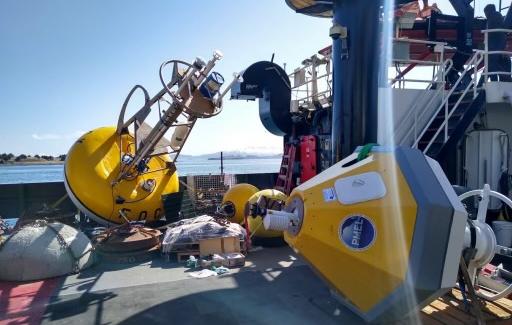The EcoFOCI spring mooring cruise departed on the NOAA Ship Oscar Dyson on May 1, from Kodiak, AK for an annual survey that was missed in 2020 due to the COVID-19 pandemic. Scientists from NOAA’s PMEL, University of Washington Cooperative Institute for Climate, Ocean and Ecosystem Studies (CICOES) and NOAA’s Alaska Fisheries Science Center will service a biophysical mooring array in the Bering Sea, collect conductivity, temperautre, depth (CTD) profiles, zooplankton and ichthyoplankton samples and conduct special projects related to harmful algal blooms and zooplankton machine learning. Results from these observations and experiments will help describe important ecosystem linkages among climate, plankton, fishes, birds and mammals. Continuous monitoring in this region provides critical data to support sustainable management of living resources in the Bering Sea and the rapidly changing US Arctic ecosystem.
The M2 surface mooring has been deployed each spring in the southeastern Bering Sea for over 25 years and provides year-round measurements of temperature, salinity, nitrite, chlorophyll, and currents in this highly productive area. Carbon dioxide measurements taken from M2 reached another milestone of 10 years collecting data. Long-term time-series at this site are a critical tool for adapting to climate change and guiding sustainable management of living resources in the Bering Sea.
EcoFOCI will also be field testing and using several technologies in collaboration with the Innovative Technology for Arctic Exploration program including pop-up floats and remote access sampler. These technologies enhance shipboard and mooring research with more data collection over a fine scale region.
This is one of 5 research cruises the program will either lead or participate in from March-October. Geoff Lebon from UW CICOES is the Chief Scientist on the cruise. The EcoFOCI program is a collaborative research effort by scientists at NOAA's Pacific Marine Environmental Laboratory (PMEL) and Alaska Fisheries Science Center (AFSC) focusing on the unique and economically important high-latitude ecosystems of Alaska.



